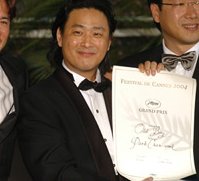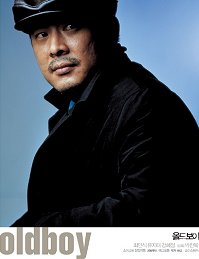 Humour in Revenge
Humour in Revenge Director Park Chan-wook has built a popular following in his native South Korea and is now gaining a strong international reputation. Highlights from the 41-year-old's career include Joint Security Area, Sympathy For Mr Vengeance and now Oldboy, which won the Grand Jury Prize at the 2004 Cannes Film Festival.
Director Park Chan-wook has built a popular following in his native South Korea and is now gaining a strong international reputation. Highlights from the 41-year-old's career include Joint Security Area, Sympathy For Mr Vengeance and now Oldboy, which won the Grand Jury Prize at the 2004 Cannes Film Festival.
In Oldboy you return to the theme of revenge that you explored in Sympathy for Mr Vengeance...
Park: When Iím insulted I can't vent my anger in front of people, and the anger has been accumulating in me, so I wanted to express that through cinema. But if I express this to my complete satisfaction, to show violence within a good film, then it makes me feel guilty. At the same time I have to express the dark side of an act of violent vengeance, even if the revenge is for a good reason.
Do you identify with any of your characters?
Park: Woo-jin [the mastermind character played by Yu Ji-tae] is almost like a film director, scriptwriter and actor at the same time. This was edited out of the final film, but we shot a scene in which Woo-jin practices his final duel with Dae-su [the central character played by Choi Min-sik]. We shot a scene where Woo-jin practices what he'll say in this version and that version. In reality when someone speaks to somebody else sometimes they stutter, sometimes it pours forth and sometimes they have to think what to say next. But when I directed that scene I asked Ji-Tae to do it exactly as written. Woo-jin in this film is an actor but also a film director who controls the life of Dae-su to the finest detail. Through this film Iím expressing the God-like nature of a film director, which makes the revenge against Woo-jin an act of rebellion against God.
There is a very careful and considered design element to the film...
Park: Sympathy for Mr Vengeance was rather minimalistic and dry, so I wanted to make something more stylish. With the pattern on the wallpaper, for instance, I wanted to give the feeling of imprisonment, of claustrophobia, so that even when Dae-su is released and walks about the streets it follows him all the time. The personal belongings of Woo-jin came about because I wanted to keep the image of fragments of a mirror, broken shards. Through music I wanted to express a vortex of emotion in a waltz style. I wanted to express the idea of the characters going round and round.
Isnít the story based on a Japanese manga?
Park: I only actually read it when a producer suggested I make this film. Actually nothing remains of the manga in the final film except for a particular characteristic in the storyline. In most other stories the perpetrator runs away and disappears, but in this story the perpetrator appears before the victim. He practically invites the victim to come to him. That element remains strongly in my film. I even tried to enhance it.
Do you worry about going too far in your depictions of violence, in this case scenes of tooth extraction or a tongue being cut out?
Park: I didnít show any of that on screen. I never showed the tongue being cut out; the camera moves from the eye to the hand, to the closing of the hand Ė thatís as far as I would go. Most people imagine that theyíve seen it, because when the camera moves from the eye to the hand theyíre watching it through their fingers, and they think theyíve seen something. So Iím accused for nothing.
Is that part of the fun of it, manipulating audience emotion?
Park: Itís more interesting to me to pull away from the scene, showing other parts of the body, expressing it through a sound effect. That interests me more.
Do your films attract criticism back home for the violence they contain?
Park: There is some criticism from religious groups. We have leniency for expressing violence, because weíve gone through a period in which violence was all too familiar under our military dictatorship.
How did you choose Gang Hye-jung for the crucial role of Mido? It's only her second film.
Park: That was important. If I had cast a well-known actress for that role people would immediately be curious about the relationship between her and Dae-su. But their true relationship has to be hidden. And also there is a lovemaking scene, which famous actresses in Korea donít like to do. Even if I had wanted to cast someone more famous, no one would have done it.
Humour seems to be very important in your films...
Park: It goes hand in hand with fear and sadness. I donít mean as a flip-flop of humour and sadness or humour and fear - they go together. What I hoped for was that the more frightening it was, the funnier it would get. Itís one thing being a particular genre with these two elements; as we live our everyday lives and we go through sadness and feel frightened itís serious to us. But if somebody else looks at it he might spot a funny side to it. In the editing suite, when weíre editing a scene where an actor or an actress cries or is in great distress, if you freeze the frame sometimes it looks as though theyíre laughing.
And now youíre working on another film with vengeance as the theme...
Park: The third film in the trilogy will be about a character who longs for salvation and atonement rather than anger, vengeance and violence.
THANKS TO SAM ROSS AT TARTAN FILM, OCT.04


PARK CHAN-WOOK FILMOGRAPHY...
Three ... Extremes (2004)

If You Were Me (2003)

The Humanist (2001)
Joint Security Area (2000)
Anarchists (2000)
Simpan (1999)
